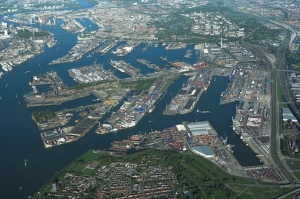


(Posted on 08/03/22)
The conflict in Ukraine has prompted the European Union and other bodies to impose a number of sanctions on Russia. The extensive import of energy (crude oil, oil products, LNG, coal) is not yet affected by sanctions, but the export and transhipment of other cargoes suffers from the uncertainty caused by the conflict and the sanctions.
Of the roughly 470 million tons transshipped through Europe’s largest port, Rotterdam, 62 million tons are oriented towards Russia (13%). Large amounts of energy carriers are imported from Russia via the port of Rotterdam. Currently this comes to roughly 30% of Russian crude oil, 25% of LNG, and 20% of oil products and coal. Russia exports products such as steel, copper, aluminium and nickel via Rotterdam. This is not yet covered by the trade restrictions announced by the European Union.
It is currently unknown what the developments in Ukraine will mean for these flows in the coming period.
Barely 10% of Rotterdam's container transport is linked to Russia. The European Union has prohibited the export of a number of goods that can be used for both civilian and military purposes (dual use). That means container cargo with Russia as its destination will receive extra Customs inspections.
The uncertainty (what exactly is covered by the sanctions, how quickly will Customs release containers for export, how is the conflict developing, how big are the payment risks etc.) means that various terminals and shipping companies have decided not to accept or handle any cargo with destination Russia at the moment.
The imposed sanctions, combined with their unknown impact on day-to-day operations or the development of the situation in the coming days, is causing uncertainties for many businesses. As a result, companies will also make individual choices on how to handle Russian cargo, as several terminals and shipping companies have already done.
Nato/the American armed forces have had agreements with one company in the port of Rotterdam for decades covering the transport of defence materials. These materials are regularly transferred via the port. It is possible that there will be more transports of defence materials in the short term.
As far as cybersecurity of businesses is concerned, port of Rotterdam has FERM. The purpose of FERM is to encourage cooperation between companies in the port of Rotterdam and to increase awareness of cyber security risks. Currently, FERM has reported that the NCSC has not yet had any concrete indications of cyber-attacks impacting the Netherlands in relation to the war in Ukraine.
The Rotterdam Port Authority has not independently drafted any policies of its own in response to the conflict in Ukraine. Nor does the Port Authority have the authority to do something like impose restrictions on businesses. This is the responsibility of the Dutch government. The Port Authority supports the policies of the Dutch and European authorities. International rule of law and the right to self-determination of countries are essential values and therefore not open to question.
With this year’s Rail Conference “Rail Freight Transport and Seaports”, a joint initiative... Read more
Asian Bulk Logistics (ABL Group) and ICG have jointly announced the successful completion of ABL&rsquo... Read more
Abu Dhabi based AD Ports Group, a leading global enabler of integrated trade, industry and logistics... Read more
The Executive Board of Hamburger Hafen und Logistik AG (HHLA) has appointed Patrick Krawutschke as Managing... Read more
Abu Dhabi based AD Ports Group, a global enabler of integrated trade, transport, industry, and logistics... Read more
This year marks a significant milestone in maritime innovation as Port Hedland, Australia, celebrates... Read more
Associated British Ports (ABP), the UK’s leading port operator, has announced the latest tranche... Read more
During the Investment, Labour, and Trade Promotion Programme in Japan (November 16–22, 2025),... Read more
AD Ports Group subsidiary Khalifa Economic Zones Abu Dhabi - KEZAD Group, the largest operator of integrated... Read more
Abu Dhabi based AD Ports Group, a global enabler of integrated trade, transport, industry, and logistics... Read more